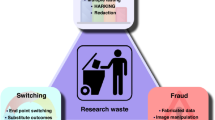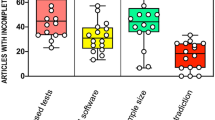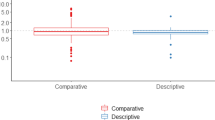Abstract
Lack of reproducibility in the scientific and lay literature of many scientific reports is an increasing concern, as are the high rates of failure to validate highly promising preclinical observations in clinical trials. There are many technical reasons why experimental results, particularly in cancer research, cannot be reproduced, including unrecognized variables in the complex experimental model, poor documentation of procedures, selective reporting of the most-positive findings, misinterpretation of technical noise as biological signal and, in the most extreme cases, fabrication of data. We suggest that cognitive biases in research and flaws in the academic incentive system also contribute to the publication of immature results. Recognition of these factors, which are often not discussed, provides additional strategies to improve reproducibility. We suggest that in addition to establishing better standards of data presentation and creating venues for publication of negative results, some changes to the grant submission and funding system could further improve the reproducibility of research findings.
This is a preview of subscription content, access via your institution
Access options
Subscribe to this journal
Receive 12 print issues and online access
$209.00 per year
only $17.42 per issue
Buy this article
- Purchase on SpringerLink
- Instant access to full article PDF
Prices may be subject to local taxes which are calculated during checkout
Similar content being viewed by others
References
Swift, R. The relationship between health and GDP in OECD countries in the very long run. Health Econ. 20, 306–322 (2011).
Munos, B. Lessons from 60 years of pharmaceutical innovation. Nat. Rev. Drug Discov. 8, 959–968 (2009).
Hutchinson, L. & Kirk, R. High drug attrition rates—where are we going wrong? Nat. Rev. Clin. Oncol. 8, 189–190 (2011).
Arrowsmith, J. Trial watch: Phase II failures: 2008–2010. Nat. Rev. Drug Discov. 10, 328–329 (2011).
Arrowsmith, J. Trial watch: Phase III and submission failures: 2007–2010. Nat. Rev. Drug Discov. 10, 87 (2011).
Daher, I. N. & Yusuf, S. W. Quantity and quality in medical research. J. Am. Coll. Cardiol. 56, 527–528 (2010).
Prinz, F., Schlange, T. & Asadullah, K. Believe it or not: how much can we rely on published data on potential drug targets? Nat. Rev. Drug. Discov. 10, 712 (2011).
Ioannidis, J. P. et al. Repeatability of published microarray gene expression analyses. Nat. Genet. 41, 149–155 (2009).
Lehrer, J. The truth wears off: is there something wrong with the scientific method? [online], (2010).
Sarewitz, D. Beware the creeping cracks of bias. Nature 485, 149 (2012).
Ransohoff, D. F. Bias as a threat to the validity of cancer molecular-marker research. Nat. Rev. Cancer 5, 142–149 (2005).
Ioannidis, J. P. Why most published research findings are false. PLoS Med. 2, e124 (2005).
Goodman, S. & Greenland, S. Assessing the unreliability of the medical literature: A response to “Why most published research findings are false”. John Hopkins University, Department of Biostatistics Working Papers [online], (2007).
Ranstam, J. et al. Fraud in medical research: an international survey of biostatisticians. ISCB Subcommittee on Fraud. Control. Clin. Trials 21, 415–427 (2000).
Buyse, M. et al. The role of biostatistics in the prevention, detection and treatment of fraud in clinical trials. Stat. Med. 18, 3435–3451 (1999).
Landis, S. C. et al. A call for transparent reporting to optimize the predictive value of preclinical research. Nature 490, 187–191 (2012).
Bagley, C. G. & Ellis, L. M. Drug development: Raise standards for preclinical cancer research. Nature 483, 531–533 (2012).
[No authors listed] Announcement: Reducing our irreproducibility. Nature 496, 398 (2013).
Moses, H. 3rd, Dorsey, E. R., Matheson, D. H. & Their, S. O. The financial anatomy of biomedical research. JAMA 294, 1333–1342 (2005).
Fanelli, D. How many scientists fabricate and falsify research? A systematic review and meta-analysis of survey data. PLoS ONE 4, e5738 (2009).
Nickerson, R. S. Confirmation bias: a ubiquitous phenomenon in many guises. Rev. Gen. Psychol. 2, 175–220 (1998).
ERA-NET on Translational Cancer Research (TRANSCAN). First Joint Transnational Call for Proposals (JTC 2011) [online], (2011).
National Institutes of Health. Validation of molecular diagnostics to predict patient outcomes using specimens from multi-site cancer trials [online], (2013).
Contopoulos-Ioannidis, D. G., Ntzani, E. & Ioannidis, J. P. Translation of highly promising basic science research into clinical applications. Am. J. Med. 114, 477–484 (2003).
DiMasi, J. A., Hansen, R. W. & Grabowski, H. G. The price of innovation: new estimates of drug development costs. J. Health Econ. 22, 151–185 (2003).
Adams, C. P. & Brantner, V. V. Estimating the cost of new drug development: is it really 802 million dollars? Health Aff. (Millwood) 25, 420–428 (2006).
Science Exchange. Reproducibility initiative [online], (2013).
Darwin, C. in More letters of Charles Darwin Vol. 2 (eds Darwin, F. & Seward, A. C.) 229 (BiblioBazaar, Charleston, SC, 2008).
Andre, F. et al. Biomarker studies: a call for a comprehensive biomarker study registry. Nat. Rev. Clin. Oncol. 8, 171–176 (2011).
National Institutes of Health. ClinincalTrials.gov [online], (2013).
Prayle, A. P., Hurley, M. N. & Smyth, A. R. Compliance with mandatory reporting of clinical trial results on ClinicalTrials.gov: cross sectional study. BMJ 344, d7373 (2012).
Freedman, D. H. Lies, damned lies, and medical science [online], (2010).
Acknowledgements
We are grateful for the constructive comments and suggestions of Lisa McShane during the preparation of this manuscript.
Author information
Authors and Affiliations
Contributions
L. Pusztai and F. Andre researched data for the article and wrote the article. All authors contributed ideas to this manuscript, made substantial contributions to the discussion of content, and reviewed and edited the manuscript before submission and following peer review revisions of the article.
Corresponding author
Ethics declarations
Competing interests
The authors declare no competing financial interests.
Rights and permissions
About this article
Cite this article
Pusztai, L., Hatzis, C. & Andre, F. Reproducibility of research and preclinical validation: problems and solutions. Nat Rev Clin Oncol 10, 720–724 (2013). https://doi.org/10.1038/nrclinonc.2013.171
Published:
Issue Date:
DOI: https://doi.org/10.1038/nrclinonc.2013.171
This article is cited by
-
Detection and analysis of chiral molecules as disease biomarkers
Nature Reviews Chemistry (2023)
-
Improving the reproducibility of findings by updating research methodology
Quality & Quantity (2022)
-
Machine learning in scientific grant review: algorithmically predicting project efficiency in high energy physics
European Journal for Philosophy of Science (2022)
-
Temporospatial shifts within commercial laboratory mouse gut microbiota impact experimental reproducibility
BMC Biology (2020)
-
High-throughput analysis suggests differences in journal false discovery rate by subject area and impact factor but not open access status
BMC Bioinformatics (2020)



